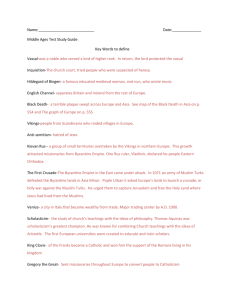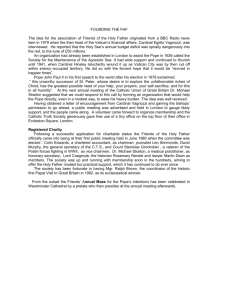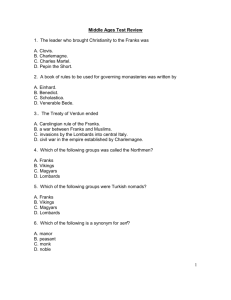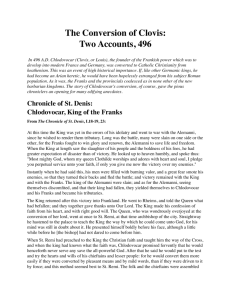The Deposition of Childeric (751)
advertisement
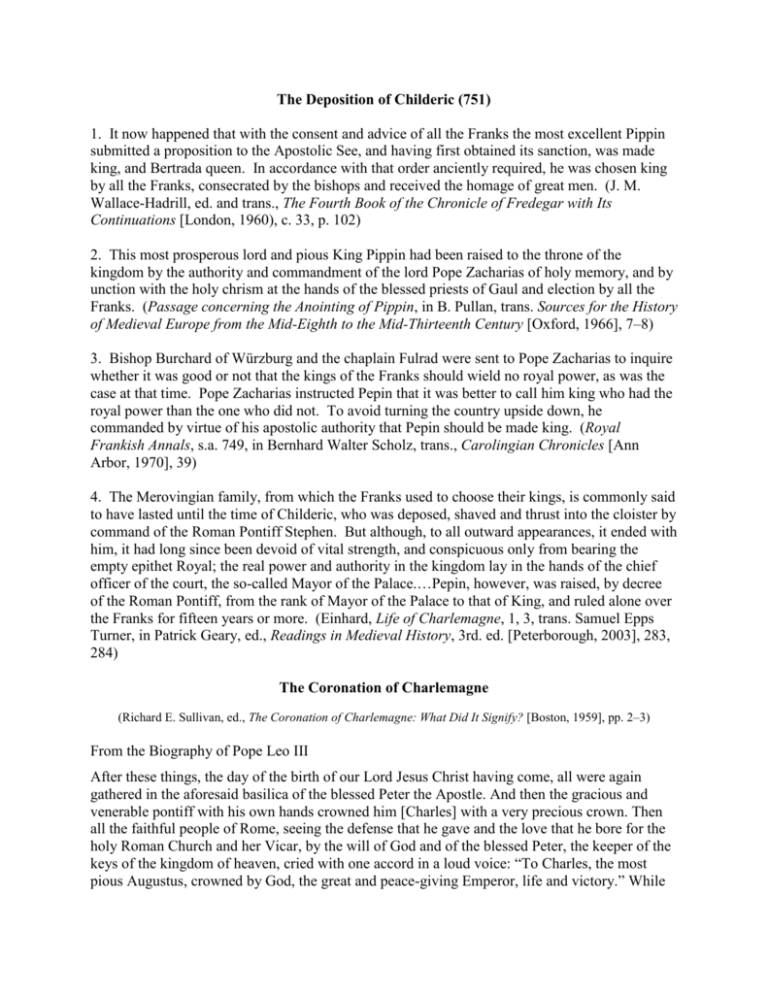
The Deposition of Childeric (751) 1. It now happened that with the consent and advice of all the Franks the most excellent Pippin submitted a proposition to the Apostolic See, and having first obtained its sanction, was made king, and Bertrada queen. In accordance with that order anciently required, he was chosen king by all the Franks, consecrated by the bishops and received the homage of great men. (J. M. Wallace-Hadrill, ed. and trans., The Fourth Book of the Chronicle of Fredegar with Its Continuations [London, 1960), c. 33, p. 102) 2. This most prosperous lord and pious King Pippin had been raised to the throne of the kingdom by the authority and commandment of the lord Pope Zacharias of holy memory, and by unction with the holy chrism at the hands of the blessed priests of Gaul and election by all the Franks. (Passage concerning the Anointing of Pippin, in B. Pullan, trans. Sources for the History of Medieval Europe from the Mid-Eighth to the Mid-Thirteenth Century [Oxford, 1966], 7–8) 3. Bishop Burchard of Würzburg and the chaplain Fulrad were sent to Pope Zacharias to inquire whether it was good or not that the kings of the Franks should wield no royal power, as was the case at that time. Pope Zacharias instructed Pepin that it was better to call him king who had the royal power than the one who did not. To avoid turning the country upside down, he commanded by virtue of his apostolic authority that Pepin should be made king. (Royal Frankish Annals, s.a. 749, in Bernhard Walter Scholz, trans., Carolingian Chronicles [Ann Arbor, 1970], 39) 4. The Merovingian family, from which the Franks used to choose their kings, is commonly said to have lasted until the time of Childeric, who was deposed, shaved and thrust into the cloister by command of the Roman Pontiff Stephen. But although, to all outward appearances, it ended with him, it had long since been devoid of vital strength, and conspicuous only from bearing the empty epithet Royal; the real power and authority in the kingdom lay in the hands of the chief officer of the court, the so-called Mayor of the Palace.…Pepin, however, was raised, by decree of the Roman Pontiff, from the rank of Mayor of the Palace to that of King, and ruled alone over the Franks for fifteen years or more. (Einhard, Life of Charlemagne, 1, 3, trans. Samuel Epps Turner, in Patrick Geary, ed., Readings in Medieval History, 3rd. ed. [Peterborough, 2003], 283, 284) The Coronation of Charlemagne (Richard E. Sullivan, ed., The Coronation of Charlemagne: What Did It Signify? [Boston, 1959], pp. 2–3) From the Biography of Pope Leo III After these things, the day of the birth of our Lord Jesus Christ having come, all were again gathered in the aforesaid basilica of the blessed Peter the Apostle. And then the gracious and venerable pontiff with his own hands crowned him [Charles] with a very precious crown. Then all the faithful people of Rome, seeing the defense that he gave and the love that he bore for the holy Roman Church and her Vicar, by the will of God and of the blessed Peter, the keeper of the keys of the kingdom of heaven, cried with one accord in a loud voice: “To Charles, the most pious Augustus, crowned by God, the great and peace-giving Emperor, life and victory.” While he was invoking diverse saints before the holy confession of the blessed Peter the Apostle, it was proclaimed three times and he was constituted by all to be Emperor of the Romans. Then the most holy pontiff anointed Charles with holy oil, and likewise anointed his most excellent son to be king, upon the very day of the birth of our Lord Jesus Christ; and when the Mass was finished, then the most serene lord Emperor offered gifts. From the Royal Frankish Annals (Annales regni Francorum) On the most holy day of the Lord’s birth, when the king, at Mass before the confession of St. Peter, rose up from prayer, Pope Leo placed on his head a crown; and he was acclaimed by the whole populace of Rome: “To Charles, Augustus, crowned by God the great and peaceful emperor of the Romans, life and victory!” And after these praises he was adored by the pope in the manner of ancient princes and, the title of patricius being dropped, he was called emperor and augustus. From the Annales Laureshamenses And because the name of emperor had now ceased to exist in the land of the Greeks and because they had a woman as emperor, it was seen both by the apostolic Leo himself and all the holy fathers who were present in that council [i.e. the council held to decide the fate of Leo III and before which he took his purification oath] and the rest of the people, that they ought to name as emperor Charles himself, king of the Franks, who now held Rome itself, where the Caesars were always accustomed to have their residence, and the rest of the places which they held in Italy, Gaul, and Germany. For Almighty God conceded these places into his hands, and therefore it seemed to them to be just, that he—with the aid of God and with all the Christian people asking—should not be lacking that title. King Charles did not wish to deny their request, and with all humility, subjecting himself to God and to the petition of the priests and all the Christian people, he received the title of emperor through the coronation of the lord pope Leo on the day of the birth of the Lord. And the first thing he did was to recall the holy Roman Church from that discord which existed there to pence and order. From Einhard’s Life of Charlemagne His last voyage [to Rome] was a result of another cause. The Romans having caused Pope Leo many injuries—torn out his eyes and blinded him—were moved to ask the aid of the king. Therefore, coming to Rome in order to put to order that which was causing too much disturbance in the order of the Church, he passed the whole winter there. It was at this time that he accepted the title of emperor and augustus. But at first he was so much opposed that he affirmed that, even though it was an important feast day, he would not have entered the church that day if he had known in advance the plan of the pope. He bore with great patience the envy of the Roman emperors, who were indignant at the title he had taken; and by his magnanimity by which he was so much superior to them he conquered their anger by sending them many legates and by calling them “brothers” in his letters. From Theophanes’ Chronicle In this year in the month of December Charles, the king of the Franks, was crowned by Pope Leo.
